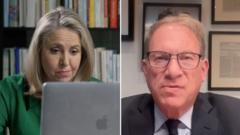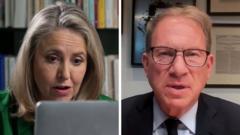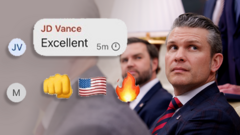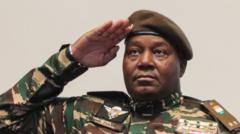Following the publication of details from a leaked Signal chat involving top U.S. officials, journalist Jeffrey Goldberg finds himself at the center of a political storm, receiving intense criticism from the Trump administration while defending the implications of national security in the incident.
Leaked Signal Chat Fuels Controversy: Journalist Jeffrey Goldberg Responds to Attacks

Leaked Signal Chat Fuels Controversy: Journalist Jeffrey Goldberg Responds to Attacks
Jeffrey Goldberg faces backlash from Trump administration officials following his revelation of sensitive information shared in a leaked Signal chat.
In a whirlwind of political drama, journalist Jeffrey Goldberg has found himself under attack from senior Trump administration officials after he exposed sensitive details shared in a recent leaked Signal chat. The editor-in-chief of The Atlantic captured headlines when he detailed his unexpected entry into a group chat that consisted of prominent national security leaders, including U.S. Secretary of State Marco Rubio and Secretary of Defense Pete Hegseth. What initially appeared as a bizarre invitation quickly transformed into a public relations nightmare for the involved officials when Goldberg reported his findings.
Goldberg's involvement began with a mysterious message through the encrypted messaging app Signal—usually a favored communication platform for journalists and government figures alike. It wasn’t long before he realized that top-tier officials were unintentionally sharing crucial military information regarding an operation in Yemen, which they were discussing openly, seemingly unaware of his presence.
Since the publication of his Atlantic article recounting the incident, the fallout has been dramatic. President Trump has referred to Goldberg as a "loser" and “sleazebag," while National Security Advisor Michael Waltz has labeled him a liar. Waltz claims that including Goldberg in the chat was an error, and he has since called on tech mogul Elon Musk to help investigate how the mistake occurred—a demand met with skepticism by Goldberg.
"There’s a certain absurdity to asking Elon Musk about basic phone contact issues," Goldberg noted. Meanwhile, Trump's administration continues to downplay the sensitivity of the information shared in the chat, asserting that it does not qualify as classified material, although Goldberg strongly disagrees. He argues that discussions about upcoming military operations and specific attack plans certainly fall into a "war-planning" category of sensitive information.
The situation is further complicated by the fact that Goldberg has previously been in the crosshairs of Trump’s criticism; he published a highly controversial piece in 2020 inferring the president’s disrespect towards fallen soldiers. In light of the recent attacks against him, Goldberg remarked, "This is their move. You never defend, just attack," as he attempted to navigate the onslaught of accusations from the administration.
As he continues to deal with the backlash, there’s a growing sentiment among experts and analysts that there are double standards for accountability within the Trump administration—something Goldberg himself pointed out. He acknowledged that if a lower-ranking official had mishandled information in a similar manner, it would likely result in severe disciplinary actions.
Ultimately, Goldberg opted to leave the Signal chat, a decision met with surprise from some quarters, yet he emphasized the complex legal and ethical ramifications involved. As this political saga unfolds, lawmakers are demanding deeper investigations into the incident, and the implications of how national security information is shared and handled by high-ranking officials are sure to be at the forefront of future discussions.





















